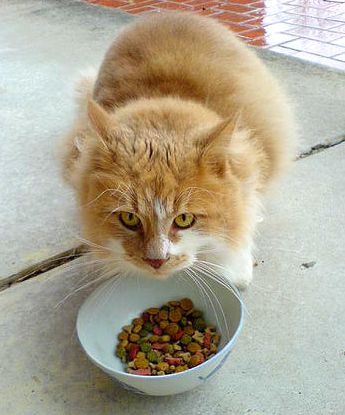Making Ends Meet While Eating Healthy - You and Your Cat!

Price is Only One Objective
Grabbing a bag of the cheapest cat food on the shelf is often not a good plan for the long term since it can lead to unintended consequences, such as vitamin and mineral deficiencies, or unhealthy weight gain (for grown cats). These health consequences alone can lead to clinical health problems requiring medical care, and now is not a good time to be taking chances with your pet's health. Before deciding on the most economically viable food brand, do your research to make sure you are choosing the best formula at the best price.
Hunt Down the Best Prices Before Buying
Discount stores are a great place to begin comparison shopping, but before you decide on a brand or store, make notes of the prices offered at the big discount/super-stores as well as at the bulk and warehouse stores. In many cases, the prices are comparable, or one choice may be more convenient in terms of travel and location.
There is also the web to take into consideration as you hunt down the best food at the best price. Some web-based companies will offer loyalty discounts, discounted or free shipping, and even coupons for free samples of products. It can be worth it to invest the time in searching for the best deals.
Reducing costs does not only mean looking for the cheapest price, though. You might find that something as simple as switching from a wet food to a dry food can save quite a bit of money, since wet foods cost considerably more due to the type of packaging. Some cats will not miss eating soft cat food, while others have to be patiently weaned from wet food to dry, and still others have to be fed a mix of the two.
Read the Labels
The ingredients listed on the label can differ significantly from brand to brand. Generally speaking, your pet needs a food with high levels of protein, as well as some fat. The first ingredient listed on the bag should be an animal protein source, such as chicken, beef, lamb, or fish. Fat sources include oils, tallow, and lard. It is important to keep in mind that cats are strictly carnivorous and do not need carbohydrates or grains to be healthy. While a dog can not only subsist, but thrive on a food that is made with a high proportion of carbohydrates and grains, a cat can suffer significantly, even fatally, if fed the same formulas.
However, a lot of cat food makers will add a carbohydrate source, such as corn meal, sorghum or barley, rice, or berries. While experts agree that cats do not need these ingredients, there is some disagreement over whether these ingredients can be problematic. If the carbohydrate content is more than the protein content, your cat will be hungrier because he will need to eat more to get the needed animal protein content. This of course will result in more carbohydrates being ingested, and the possibility of excess weight gain as a result. In the end, the lower priced, carb-rich cat food is not an economical choice at all. The best thing is to do your research, know how to read a label, and make an informed decision.
Ideally, you should feed your cat a food that has been certified “complete and balanced” by the Association of American Feed Control Officials (AAFCO). This certification means that the food has been tested by a board of veterinarians and has been shown to be a nutritionally complete food for your cat.
Talk to Your Doctor
Changing the diet is not for everyone, and it may not be the solution that will best serve your family's needs. If your cat is on a prescription diet or is being treated for a long-term medical condition, ask your veterinarian for advice on whether another brand can be substituted to reduce your household costs. It is possible that there is no other food that can be fed to your cat because of an underlying health condition, but in most cases, a way can be found so that you can feed yur cat the food he needs while keeping him with the family.
Finally, while table scraps and leftovers of your family's food is a good treat for your cat, they should not take the place of formulated animal food that has the added minerals and fats your pet specifically needs. Cats in particular need taurine, arginine, niacin, preformed vitamin A, and specific types of essential fatty acids. Cats that are deficient in any of these food ingredients can suffer severe health problems.
Do not be shy about asking your veterinarian what you can do to make your situation easier to handle. You are not alone, and veterinarians encourage families to stay together, even during the rough times. Your vet may know who you can contact for cat food assistance, if needed. Again, research is key. Call around and see if there are any pet charities or shelters that are having pet food fund raisers or food collection drives to help families in need.
Image source: irrational_cat / via Flickr